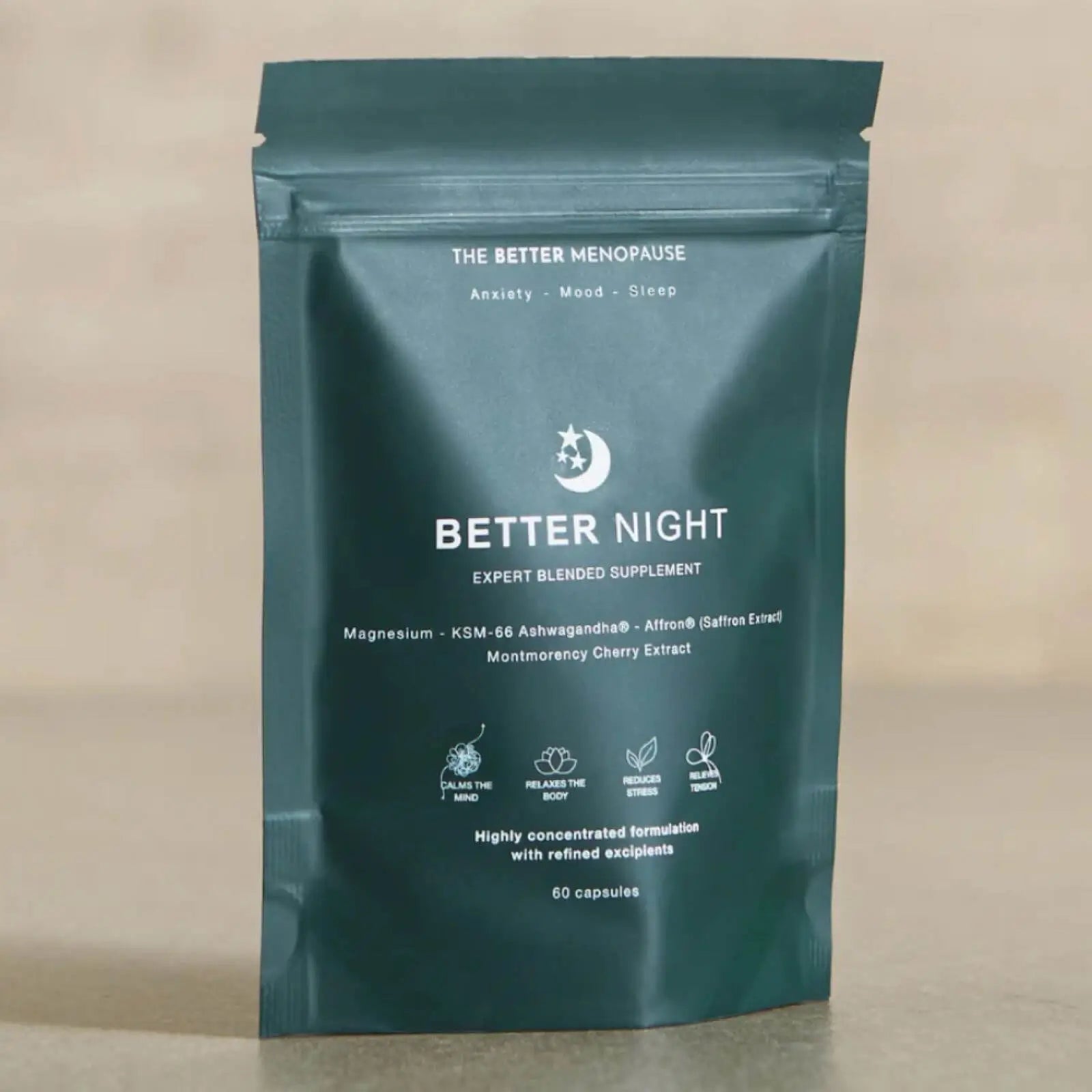
Can these supplements and remedies help with menopause joint pain?
We look at the research behind supplements for perimenopause and menopause joint pain, as well as quick relief treatments and the role nutrition can play.
Painful, aching joints are a common menopause symptom – but what can you do to relieve them? In this article, we assess a range of supplements and natural remedies that may help with joint pain by reducing inflammation and maintaining the health of the cartilage in your joints.
We also suggest some things to try if you need faster relief from menopause joint pain, and look at how the right diet can provide you with many of the same active ingredients found in supplements.
While these approaches may help to manage symptoms in some people, if continuing joint pain is making life difficult, it’s important to talk to your doctor.
If you're experiencing other menopause symptoms along with your joint pain, the beneficial bacteria in The Better Gut probiotic supplements can help. To learn more about improving your menopause symptoms, visit The Better Gut.
And for 10% off your first order, use the discount code WELCOME10.
What causes menopause joint pain?
Perimenopause and menopause lead to fluctuations, and eventually a reduction, in your levels of the reproductive hormone oestrogen.
As with many menopause symptoms, this fall in oestrogen plays a part in menopause joint pain.
Although scientists are still unravelling exactly how this works, they do know there are oestrogen receptors in cartilage – the substance that acts as a cushion between your joints – as well as in the connective tissue and specialised type of bone in your joints.
Having less oestrogen may therefore impact these areas, leading to inflammation and deterioration of the joints.
Menopause joint pain can occur in any of your joints but is particularly common in:
- neck and shoulders
- wrists and hands
- hips
- knees
Women who have been through menopause also have a higher risk of developing osteoarthritis, which causes joint pain and stiffness, most often in the hands, hips and knees.
8 supplements that may help with menopause joint pain
There are a number of supplements and natural remedies that may help to reduce joint pain for women who have been through menopause or have developed arthritis.
For some, the evidence is relatively strong while in other cases more research is needed.
1. Omega-3 fatty acids
Both fish oil and algae supplements are rich in the omega-3 essential fatty acids eicosapentaenoic acid (EPA) and docosahexaenoic acid (DHA), which have anti-inflammatory properties.
One study found that women who took 1,000 milligrams (mg) of omega-3 fish oils each day for 12 weeks saw a significant reduction in a range of menopausal symptoms, including joint pain and stiffness.
High-dosage fish oil supplements like these have also been shown to reduce joint swelling and pain in people with the inflammatory disease rheumatoid arthritis.
2. Glucosamine and chondroitin
Glucosamine and chondroitin are chemical compounds found in cartilage. You can buy them as separate supplements but they’re often combined in one.
Glucosamine and chondroitin are sometimes prescribed for people with osteoarthritis, which is most common in women who have been through menopause.
Although some large-scale studies have shown mixed results, others have found that a particular form of glucosamine – glucosamine sulphate – can help to protect cartilage and reduce pain in people with osteoarthritis in their knees.
3. Collagen
Collagen is another important component of the cartilage between your joints. Research suggests that menopause and aging can affect the way your body processes collagen to maintain cartilage.
Studies have found that supplements containing collagen peptides, also known as hydrolysed collagen, can help protect cartilage, improve joint function and reduce joint pain.
4. Vitamin D
Vitamin D helps your body to absorb calcium and maintains the health of your bones. It also has anti-inflammatory properties.
Having lower levels of vitamin D has been linked to increased joint pain in both post-menopausal women and people with rheumatoid arthritis.
However, it’s not completely clear whether increasing your intake of vitamin D can reduce joint pain. Some researchers suggest that a vitamin D supplement might help with joint pain if you’re deficient but is unlikely to make much difference if you already get enough vitamin D.
5. Vitamin K
Vitamin K is another anti-inflammatory vitamin that’s also crucial for building bone, as well as the cartilage that protects your joints.
Although some scientists believe that vitamin K supplements have the potential to protect against osteoarthritis – which causes joint pain and stiffness – studies so far have shown conflicting results about its effectiveness and more research is needed.
6. Methylsulfonylmethane
Methylsulfonylmethane – MSM for short – is an anti-inflammatory compound that occurs naturally in your body and may protect against the breakdown of cartilage.
In one study, women and men over the age of 50 who took 1,200 mg MSM supplements for 12 weeks saw significant improvements in joint pain, stiffness and swelling.
Meanwhile, a small pilot study, involving people with osteoarthritis in their knees, found that very high doses of MSM – totalling 6,000 mg per day – also helped reduce pain and swelling.
7. Turmeric and curcumin
The spice turmeric is a natural remedy that has been used in traditional medicine for thousands of years. Scientists agree that its active ingredient curcumin has anti-inflammatory properties.
Studies looking at high-dosage curcumin supplements have found some evidence that they may help with joint pain in people with arthritis. One small pilot study even suggested that taking 500 mg of curcumin per day was better at reducing joint tenderness and swelling than the anti-inflammatory drug diclofenac.
Curcumin only makes up a small percentage of turmeric, and your body is not very good at absorbing it. If you want to try it as a supplement, choose curcumin capsules that also contain back pepper, or its active ingredient piperine, which helps with absorption.
8. Probiotics
Probiotics are live microorganisms that can have a beneficial impact on many aspects of your health when you consume them.
Scientists have identified a number of specific strains of bacteria that can significantly improve symptoms related to menopause joint health, including reducing inflammation, strengthening your immune system, increasing bone density and lowering the risk of osteoporosis.
These bacteria also help with a range of other menopause issues, including:
- hot flashes and night sweats
- mood and symptoms of anxiety and depression
- brain fog and mental fatigue
- sleep quality
- bloating and constipation
- vaginal health
- maintaining a healthy weight
To find out more about these beneficial bacteria, and how you can get started on your journey towards a better menopause, visit The Better Gut.
If you’d like to join a supportive community sharing regular expert tips on menopause health and nutrition – and get 10% off your first order – why not sign up for our newsletter.
Quick treatments for joint pain
Supplements may help to reduce menopause joint pain in the medium to long term, but here are some things to try to if you need immediate relief:
- NSAIDs: Non-steroidal anti-inflammatory drugs like ibuprofen and paracetamol can help to relieve pain by reducing inflammation.
- Careful stretching: Stretching can lubricate your joints and increase your range of motion. Just make sure to warm up before static “stretch and hold” poses.
- Ice packs: Cold decreases blood flow and reduces swelling and inflammation. It also stimulates receptors that help to block pain impulses.
Nutrition for menopause joint pain
If you think you may be deficient in certain nutrients, and are finding it hard to get enough from your diet, supplements can be a good solution.
However, the substances in many of the supplements we’ve looked at are naturally present in whole foods, along with a host of other important micronutrients.
Try including these foods in your diet:
- Fish: Oily fish like salmon, anchovies and mackerel are great sources of omega-3s and studies have shown that some of the health benefits of eating fish are better than taking fish oil supplements.
- Chicken: Chicken is a good natural source of collagen but more of it is in the bones, cartilage and skin than the meat itself. Get the most out of it by using those leftover parts to make your own stock.
- Extra virgin olive oil: You probably know that extra virgin olive oil is great for heart health, but it also contains a compound called oleocanthal, which reduces inflammation and pain sensitivity in a similar way to drugs like ibuprofen.
- Nuts: Nuts are another inflammation-fighting food. And because their healthy proteins and fibre make you feel full, they can also help with weight loss, which means less pressure on your joints.
- Leafy greens: Veg like kale, spinach and broccoli are good sources of vitamin K, which helps protect the cartilage in your joints. They also contain small amounts of MSM, which may do the same. And, of course, there’s all that healthy fibre.
- Colourful fruit and veg: “Eating the rainbow” provides you with a wide variety of antioxidants and anti-inflammatory compounds. It’s one of the best things you can do for your overall health, especially during perimenopause and after menopause.
When to see a doctor about joint pain
Although joint pain is a common symptom of menopause, there are lots of other potential causes. These include arthritis, which may not be related to menopause, and joint infections.
Whatever the cause, a doctor will be able to make a diagnosis and prescribe the right treatment.
The NHS recommends seeing a GP if:
- joint pain is preventing you from doing normal activities
- it’s disturbing your sleep
- it’s getting worse or keeps coming back
- it hasn’t improved after 2 weeks of treating it at home
- your joints feel stiff for more than half an hour after you wake up
Summary
Joint pain is a common symptom of perimenopause and menopause. You may notice it in your neck, shoulders, wrists, hands, hips or knees, and sometimes in other joints.
There are several supplements available that aim to help with menopause joint pain. Most involve reducing inflammation and maintaining the health of the cartilage in your joints.
These supplements don’t work for everyone and in many cases more research is needed to understand how effective they might be. Some that show promise include omega-3 fatty acids, collagen and methylsulfonylmethane (MSM).
Some of the same substances in joint pain supplements are also found in certain foods. You may be able to improve your health and reduce inflammation by eating more oily fish, nuts, extra virgin olive oil, leafy greens and a range of colourful fruit and veg.
For acute joint pain, some people get relief from anti-inflammatory drugs like ibuprofen and paracetamol, stretching or cold compresses. If your pain continues, you should see a doctor.
The beneficial bacteria in The Better Gut probiotic supplements can help with a whole range of menopause symptoms, including supporting your immune system, improving bone density and reducing the risk of osteoporosis, as well as hot flashes, bloating, brain fog and mood swings.
To learn more about improving your menopause symptoms, visit The Better Gut. For 10% off your first order, use the discount code WELCOME10.



